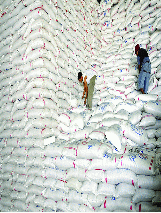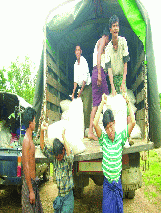SUPPLY AND DEMANDS
SUPPLY AND DEMANDS
Are middlemen hampering Meghalaya’s foodgrain supply?
 Is the State Food Corporation of India (FCI) to be blamed when low quality rice is being supplied in the fair price shops or in any public distribution system? Interestingly a recent visit to the FCI godown at Shillong clearly indicated that grade A quality rice is supplied to every whole seller, stockiest, fair price shop and even public distribution system. This raises the question as to why, in spite of the FCI supplying grade A materials, common people get low quality rice and sugar. This question needs to be asked by one and all.
There are three categories of rice which state FCI supplies, grade A, grade B, grade C& D depending on the length and breadth of the rice grain and its colour. “The monthly allocation of food grains under the Target Public Distribution System is supplied by the FCI after a sample is drawn from the sacks of food grain which are then sealed and signed by the parties concerned in the presence of the whole seller, FCI members and officials from the state government,” said Gautum Kumar AOC FCI.
Is the State Food Corporation of India (FCI) to be blamed when low quality rice is being supplied in the fair price shops or in any public distribution system? Interestingly a recent visit to the FCI godown at Shillong clearly indicated that grade A quality rice is supplied to every whole seller, stockiest, fair price shop and even public distribution system. This raises the question as to why, in spite of the FCI supplying grade A materials, common people get low quality rice and sugar. This question needs to be asked by one and all.
There are three categories of rice which state FCI supplies, grade A, grade B, grade C& D depending on the length and breadth of the rice grain and its colour. “The monthly allocation of food grains under the Target Public Distribution System is supplied by the FCI after a sample is drawn from the sacks of food grain which are then sealed and signed by the parties concerned in the presence of the whole seller, FCI members and officials from the state government,” said Gautum Kumar AOC FCI.
According to the Right to Information filed by Maitshaphrang Chairman Mr. Michael Syiem on 29 January 2010 for the year 2008-09. The monthly allocation of food grain under the Target Public Distribution System (TPDS) is received from the Government of India, Ministry of Consumer Affairs and Public Distribution, Department of Food and Public Distribution. In 2008 grade B rice was supplied by the FCI from July till December, but in 2009 only grade A rice was supplied from the FCI godown. Since FCI has no jurisdiction to check the materials after it leaves its godown, the responsibility is entirely on the State Government and the Department of Food and Civil Supply to do the needful.
When price rise is an issue in every state, this trait was amply illustrated by Mr. Syiem - Rice for the Above  Poverty Line (APL) bought from a fair price shop costs Rs 10 a kilo. The same is released from the FCI state godown at Rs. 830 a quintal. Rice for Below Poverty Line (BPL) costs Rs 6.50 paisa a kilo, AAY Rs 3.20 paisa a kilo and through Annapurna, 10 kgs of rice is provided every month free of cost. What is surprising is that in the open market, the same grade A rice is sold at rupees 26 per kg. As far as sugar is concerned, the FCI supplies sound and free flowing sugar for APL, BPL, AAY. The cost of sugar from a fair price shop is rupees 15 a kilo, while in the open market, sugar costs more than rupees 45 a kilo, which implies that when the demand is high and the supply is low, the price escalation is through the roof. With regards to the allocation of wheat, the state Government supplies the flour mills on a monthly basis which in turn have to supply all the fair price shops, which in this case never happens. When a whole seller distributes good quality rice as supplied by the FCI, 80% of the common man will buy rice and sugar from the fair price shop instead of buying the same from the open market lamented Mr. Syiem.
Poverty Line (APL) bought from a fair price shop costs Rs 10 a kilo. The same is released from the FCI state godown at Rs. 830 a quintal. Rice for Below Poverty Line (BPL) costs Rs 6.50 paisa a kilo, AAY Rs 3.20 paisa a kilo and through Annapurna, 10 kgs of rice is provided every month free of cost. What is surprising is that in the open market, the same grade A rice is sold at rupees 26 per kg. As far as sugar is concerned, the FCI supplies sound and free flowing sugar for APL, BPL, AAY. The cost of sugar from a fair price shop is rupees 15 a kilo, while in the open market, sugar costs more than rupees 45 a kilo, which implies that when the demand is high and the supply is low, the price escalation is through the roof. With regards to the allocation of wheat, the state Government supplies the flour mills on a monthly basis which in turn have to supply all the fair price shops, which in this case never happens. When a whole seller distributes good quality rice as supplied by the FCI, 80% of the common man will buy rice and sugar from the fair price shop instead of buying the same from the open market lamented Mr. Syiem.
Complaint after complaint was heard that most of the whole sellers blame the state FCI for bad quality of food grains when inquired by the common people. Taking note of this situation, Maitshaphrang Chairman Mr. Michael Syiem said that it is time that the government does away with whole sellers, stockists and set up more godowns all over the district for community based societies to distributed food grain to the people. The community based society will take the responsibility and the FCI will distribute directly to these community based societies.
These communities based societies will adhere to the good quality food grain as per the grade supplied by the FCI. “If states like West Bengal, Tripura, Mizoram can do away with whole sellers and stockiests what is stopping Meghalaya?” asks Mr. Syiem.
NCP General Secretary Purno A Sangma said that what the government needs is a vigilance to check not only the FCI godowns but also the whole sellers, recalling his contribution during his tenure as a Chief Minister of the state.
State Food and Civil Supply minister Ampareen Lyngdoh said that reacting on the Superme Court resolution, the number of whole sellers in the state was shortlisted from 519 to 219.
In light of these observations, doing away with whole sellers and stockists altogether actually seems like a pretty good idea.
Geffrey Kharkongor


